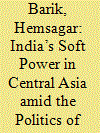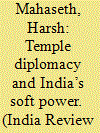| Srl | Item |
| 1 |
ID:
155180


|
|
|
|
|
| Summary/Abstract |
The first decade of the twenty-first century saw the chants of the rise of an Indian superpower. These claims of the twenty-first century as India’s century were not only based on the massive economic growth that the country saw in the post-1991 liberalisation period, and the concomitant boost in military infrastructure, but also by virtue of its having the biggest functional democracy, an influential multi-million plus diaspora, the sway of Bollywood in the region and abroad and the spectacular religious-linguistic diversity of the country. From conducting mega disaster-relief operations during the 2004 tsunami to effectuating the world’s largest civil evacuation during Operation Rahat, India has ceaselessly augmented its soft power potential to project its national power in the region. This article is an attempt to analyse the possibilities and challenges that India faces in the effective functioning of its soft power in the region. It also remarks as to how India’s soft power limitations can be quashed by integrating a smart power approach in its foreign policy by strengthening existent digital and public diplomacy infrastructure.
|
|
|
|
|
|
|
|
|
|
|
|
|
|
|
|
| 2 |
ID:
193362


|
|
|
|
|
| Summary/Abstract |
India’s presence in Central Asia cannot be compared with Russia and China in any fields. Due to their geographical proximity both has the opportunity to influence the people and politics. Now, it depends upon the government and people whom to choose to influence their governance. According to Joseph Nye, every country has their own unique soft power to expor t to abroad
depending upon their geopolitics of the nation.
|
|
|
|
|
|
|
|
|
|
|
|
|
|
|
|
| 3 |
ID:
189432


|
|
|
|
|
| Summary/Abstract |
India’s pursuit of a position within the structure of Southeast Asian States has seen its most extensive ‘soft power’ campaign in all probability. One of the most effective forms of these soft power campaigns is its cultural diplomacy invoked through a shared cultural heritage with the Southeast Asian States. This cultural diplomacy takes the form of a multitude of instruments. However, the instrument of temple restoration as a form of cultural diplomacy is rarely analyzed irrespective of its steady presence in the last decades. This article is an attempt to fill in the gaps between the understanding of soft power and cultural diplomacy through temple restorations. The authors in this article examine India’s restoration of temples across the Southeast Asian States as a form of its cultural diplomacy and analyzes the effectiveness of the same as an instrument of soft power. In the first section, the authors examine the concept of ‘soft power’ and India’s efforts in the exercise of the same through the restoration of temples. In the second section, the author analyzes India’s exercise and development of ‘soft power’ with specific reference to how Buddhism enables India to develop its relations with Southeast Asian States. In the third section, the author examines whether India’s cultural diplomacy through its restoration of temples has actually had a positive impact in developing India’s relations with other Southeast Asian States. Finally, the authors analyze whether there is any merit to a continuation of such measures of its cultural diplomacy as an instrument of its soft power.
|
|
|
|
|
|
|
|
|
|
|
|
|
|
|
|